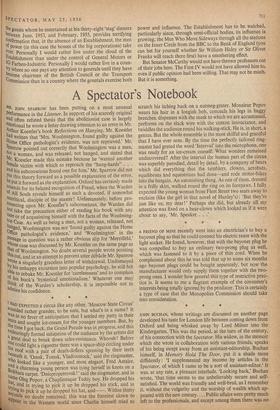A Spectator's Notebook
IQ. JOHN SPARROW has been putting on a most unusual Performance in the Listener. In Support of his scarcely original and often refuted thesis that the abolitionist case is largely eArnotional he wrote a letter drawing attention to an error in Mr. L'Itthur Koestler's book Reflections on Hanging. Mr. Koestler Jd written that 'Mrs. Woolmington, found guilty against the sprne Office pathologist's evidence, was not reprieved.' Mr. Parrow pointed out correctly that Woolmington was a man, ant a woman, and was released, not hanged, and stated that r. Koestler made this mistake because he 'wanted another etnale victim with which to reproach the "hang-hards" . . . and his subconscious found one for him.' Mr. Sparrow did not put this theory forward as a possible explanation of the error, "e Put it forward as the explanation. Oxford has certainly made rends for its belated recognition of Freud. when the Warden c)` All Souls reveals himself as such a devoted, if somewhat uncritical, disciple of the master! Unfortunately, before pro- n°uncing upon Mr. Koesder's subconscious, the Warden did not take the precaution either of reading his book with any etare or of acquainting himself with the facts of the Woolming- L°11 Case. As well as being a man, not a woman, released, not "clanged, Woolmington was not 'found guilty against the Home „ fnce pathologist's evidence,' and 'Woolmington' in the _ssage in question was a rather obvious slip for `Merriffeld,' twisnose case was discussed by Mr. Koestler on the same page as th4a, t of Woolmington. No doubt several people wrote pointing vv"Is out, and in an attempt to prevent utter debacle Mr. Sparrow L rote a singularly graceless letter of withdrawal. Undismayed _uy his unhappy excursion into popular psychology, he still felt al to rebuke Mr. Koestler for 'carelessness' and to complain tnhf. his book's 'hysterical emotionalism.' Whatever one may Ink of the Warden's scholarship, it is impossible not to admire his confidence.










































 Previous page
Previous page